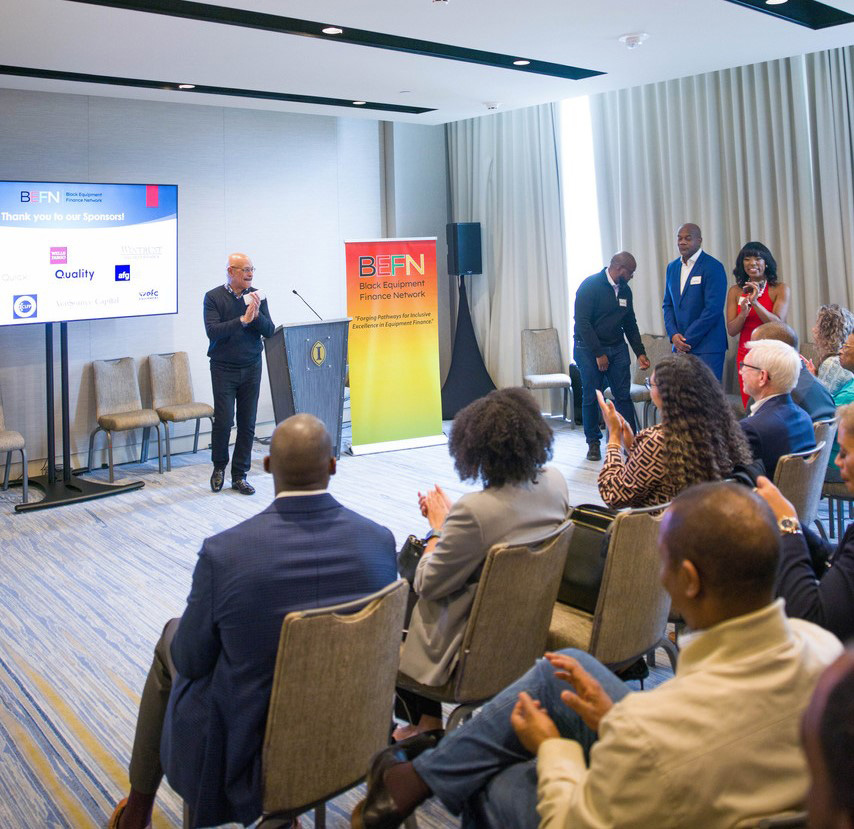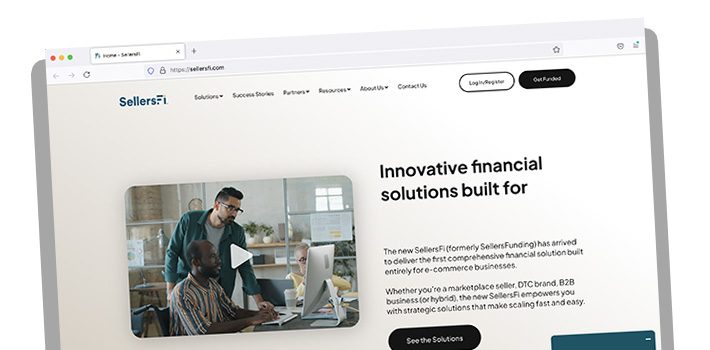Shaping Industry Experts With the CLFP
April 10, 2023 The CLFP (Certified Lease & Finance Professional) is a certification program for professionals in the equipment finance and leasing industry. The end-to-end course covers sales and marketing, credit, documentation, funding, and various accounting intricacies specific to the leasing and finance arena.
The CLFP (Certified Lease & Finance Professional) is a certification program for professionals in the equipment finance and leasing industry. The end-to-end course covers sales and marketing, credit, documentation, funding, and various accounting intricacies specific to the leasing and finance arena.
“It is a designation now that a lot of employers look fondly upon when they are trying to hire for positions because it indicates that the person who has the designation has basically gone through a very extensive process to learn everything about the industry as a whole…,” said Lia Wax, President of CLFP.
Within the last few years, COVID forced the academy to go virtual but has recently gone back to offering in-person classes in regions that span from the west coast to Philadelphia to Chicago and more. They have also launched an online self-paced option where a candidate can choose to do it at their leisure through a prerecorded self-paced product.
“Usually, the academies are hosted by somebody within the industry and then the company that’s hosting the ALFP (Academy for Lease & Finance Professionals) can decide whether or not they want it to be a private one for just their own employees or if they’re going to host the public one.”
The academy offers two options; a two-day option, which is two full eight-hour days of instruction and then we have a three-day option, which is four to four-and-a-half hours a day for three days. Between them both, they already have 12 courses scheduled up to June.
Once the course is completed, the academy maintains ongoing contact with students throughout the year, including an annual CLFP day.
People can also get together in various regions to network at different conferences. For example, the third day on NEFA’s agenda was closed by a CLFP toast to give those individuals the opportunity to discuss their journey in the industry with other members.
“I think the driving force here is to make sure that people in our industry are as educated and as informed as they possibly can be about the industry that we’re working in,” said Wax. “It’s great for somebody in sales or credit or accounting to know their facet of what they do, but I think the value-add for the foundation is we are able to provide education to applicants about all the different pieces that go into making up the industry and how it functions. And it helps us see the bigger picture.”
Mental Health in The Funding Game
April 6, 2023 Technology, finance, healthcare, sales, and marketing have all been reported to have the highest levels of employee stress and mental health issues. Eager, driven executives of this industry work around the clock to close deals, finance equipment, and conjur fresh new ideas. While alternative finance can be deemed the industry that never sleeps, the people pushing it forward should remember not to push themselves too hard. Prioritizing one’s mental health can often be found at the bottom of one’s checklist but should be the first thing assessed before starting the day.
Technology, finance, healthcare, sales, and marketing have all been reported to have the highest levels of employee stress and mental health issues. Eager, driven executives of this industry work around the clock to close deals, finance equipment, and conjur fresh new ideas. While alternative finance can be deemed the industry that never sleeps, the people pushing it forward should remember not to push themselves too hard. Prioritizing one’s mental health can often be found at the bottom of one’s checklist but should be the first thing assessed before starting the day.
“It is critical that we start really focusing in on understanding that mental health is part of every everything we do, every part of who we are, how we see ourselves, how we interact with others, how willing we are to take risks, how willing we are to be ambitious, and how forgiving we are of ourselves when we make mistakes,” said Nancy Robles, President at Eastern Funding LLC.
Success is an adrenaline rush and can be addicting if not managed properly. Jessica Garcia, CEO at Simplified Funding Solutions, at one point struggled to find a balance between her work and home life, leaving her feeling burnt out more days than some. She believed the more hours put in working on a deal the faster results she’d attain in return. Finding ways to regroup and reassess, she created her own methods within the workplace to cater to her mental health.
“I started doing like a lot of self-care within the workplace,” said Garcia. “So what I mean by that, as opposed to sitting at my desk and being glued to a hard phone on a conference call for an hour, I would just put it on my cell phone through my air pods, walk around, grab a stress ball, sightseeing, have meditation music in the background at a very low volume to help stimulate. I would turn on some candles to help with the aromatherapy and I noticed once I started doing those things, I was able to pace myself more and I was also happier…”
Meanwhile, For Nancy Robles, she’s not just the president of a company but also a full-time mother of five. The pressure of performing as a woman of color in this industry while juggling motherhood are constantly clashing and finding themselves at odds with one another. But as of late, Robles has learned to emphasize mental health into her daily routine.
“Over the past several years, I’ve prioritized my mental health and as I have prioritized my mental health that comes with a lot of self-care, a lot of healing,” said Robles. “I’m a big advocate for therapy, everybody should go to therapy. I’ve been going to therapy for seven years.”
 Unlike Robles and Garcia, finding a work/home life balance has its own unique twist for Sonia Alvelo whose fiancée is also her partner at work. And after 15 long years together they’ve managed to find stability between the two.
Unlike Robles and Garcia, finding a work/home life balance has its own unique twist for Sonia Alvelo whose fiancée is also her partner at work. And after 15 long years together they’ve managed to find stability between the two.
“Communication is big for us in everything that we do, in order to be better,” said Alvelo, CEO at Latin Financial. Administering daily mental health exercises in one’s routine can make all the difference but having the support of one’s employer can make an even bigger one.
Incorporating necessary steps and open communication in the workforce can help a team or staff to not feel as if they are being hammered by their 9 to 5. On this, Jessica Garcia has noticed companies moving in the right direction, implementing more group activities and break spaces for women especially as they are growing in number in the finance sector.
“We’re getting that softer, feminine touch, in regard to ‘it’s okay to take a day off if you’re over it, it’s okay to go home early if you’re just burnt out,’” said Garcia. “’It’s okay to ask for help if you’re overwhelmed and need assistance from the team to complete a task. It’s okay to be vulnerable, it’s okay to be human,’ we’re not robots, we’re not machines. And I think in the past two years, especially after the pandemic, we’re starting to see that synergy of being there for each other.”
Alvelo recognizes the significance mental health has within a company as a CEO. Weekly discussions with her team throughout the years has helped for a happy community life in her office.
“I have a responsibility as a CEO and I have a big one on top of that because I’m a Latina CEO. I have to bring things to the table that other companies may not talk about it or may not talk about enough.”
Success starts within oneself to achieve it anywhere else. In order to put your best foot forward in this industry take time, check in, and evaluate your mental health.
“One of the critical pillars of having any success in any type of career,” said Robles, “if you own your own company, if you want any successes, you want to have your relationships in your family, your relationship with yourself, which is the most important one, you really have to address mental health first.”
BEFN: A New Networking Space for Black Equipment Finance Professionals
March 30, 2023 “The event’s theme, ‘forging inclusive excellence in equipment finance,’ set the tone for the group’s mission to advance diversity, equity, and inclusion (DEI) in the industry,” said George Parker, Co-CEO at VenSource Capital LLC.
“The event’s theme, ‘forging inclusive excellence in equipment finance,’ set the tone for the group’s mission to advance diversity, equity, and inclusion (DEI) in the industry,” said George Parker, Co-CEO at VenSource Capital LLC.
Newly formed in January, the Black Equipment Finance Network (BEFN), is a non-profit organization focused on increasing the attendance of black professionals in the equipment finance industry. While providing network opportunities for people in the industry, the organization assists in promoting business collaboration, industry support and outreach, professional development, and Diversity, Equity and Inclusion (DEI) advocacy.
“I think the industry, given the mixer that we had last week in San Diego, is poised for [even more growth]. Many people showed up in support of what we’re looking to do,” said Lovern Gordon, National Sales Executive at Boston Financial & Equity Corp. “And that was a huge, huge, huge show of a vote of confidence that we’re headed in the right direction.”
The organization recently had their first inaugural mixer to kick off NEFA’s 4-day event, last week in San Diego. Filled with members and allies, the mixer dedicated a one-hour block to networking with people of color (POC).
“It was the most people that I and many others in the room have seen in terms of numbers for black people in the equipment finance industry in one space ever,” said Gordon.
For many POC, working in equipment finance can feel intimidating as the field is predominately a white-male led industry. The network is an all-around safe space for people that share in their likeness while being able to address issues of feeling left out of conversations or not feeling understood by their peers. The leadership team alongside Gordon (Secretary/Director), consists of George Park (President), Nancy Robles (Director), Kareem Jernigan (Treasurer/Director), Andre Olaofe (Director), and Eric McGriff (Director).
“This is a long overdue group of primarily black and people of color professionals in the equipment finance industry, that have just come together to form a small group within the industry to create an awareness of the black professional in the equipment finance industry,” said Andre Olaofe, President at Select Funding.
An active member of BEFN will typically attend monthly virtual meetings, have the option to be on panels, opportunity to come to regional and national events, advocate for laws and policies to improve within the industry, have access to the member directory, and mentorship.
“I’m on the steering committee,” said Cheryl Tibbs, CEO at Equipment Lease & Co. “The steering committee, we meet to set the agenda for the organization for our meetings. Just really to set the agenda for the group.”
The support from non-POC peers in the industry has been fantastic, Gordon explained. Several sponsors such as Dedicated Financial GBC, Wells Fargo Capital, North Mill Capital, and Wintrust Specialty Finance attended and donated, which contributed to pulling the mixer off. Tibbs noted the overwhelming response of non-black professionals that wanted to be involved who also saw a need for DEI within these organizations.
“The president of the National Equipment Finance Association, the board members of NEFA, the other members for funding sources, other brokers, all welcomed the group in San Diego, and came out to the mixer,” said Olaofe, “and were actively involved in at least sharing in the celebration of coming together and this inaugural mixer.”
Why SellersFunding is Now SellersFi
March 28, 2023 The financial platform dedicated to servicing e-commerce companies is now going by the name, SellersFi. Diversifying the brand beyond their funding capabilities, the rebranding is to bridge the gap between working capital and payment solutions.
The financial platform dedicated to servicing e-commerce companies is now going by the name, SellersFi. Diversifying the brand beyond their funding capabilities, the rebranding is to bridge the gap between working capital and payment solutions.
Onward with the name change, starting in April they’ll be offering insurance and improving the capabilities of their digital wallet. And in Q3 this year, they’ll be launching FDIC insured business checking accounts for their clients, as well as credit cards. SellersFi will also continue to fund from as low as $25,000 to $10 million, to be the go-to platform for all their customers’ financial needs.
“…working capital and risk management is in our DNA, it’s the core of our business, and we will always be like that,” said Ricardo Pero, CEO at SellersFi. “But that doesn’t mean that we will turn our backs to opportunities to serve our clients in a more efficient way than what they have these days in other segments of the market.”
Clients already can channel their marketplace payouts digitally, so the idea is to offer an under-one-roof, all-in-one solution. They have also added on a product called Invoice Flex where their clients can choose to pay between 3 to 12 installments on their invoice.
“Every time our customers demand solutions and improvements in our platform, we hear them,” said Pero.
Time Kills Deals
March 20, 2023
Time can turn an eager client into an unsure client. Maybe it’s the introduction of third-party influence that sways opinion or perhaps it’s just a loss of energy and momentum that starts to manifest into a game of second-guessing before closing. Bruno Raschio, Tom Gianelli, and Scott Platto gave their take to deBanked on how time can hinder the sales process and what to do to alleviate it.
How can one increase the velocity of a sale?
“It all depends on how the ISO can sell the merchant to get their documents in faster and how bad the merchant needs money.”
– Scott Platto, ISO Relations Manager, TMR NOW
“A lot of the time that it takes to get these deals done is the time that it takes to receive the additional paperwork that we need aside from the application from the applicant. For instance, we need bank and tax information and a lot of times – the person is a truck driver, so they could be on the road – may not have access to their taxes. So, a lot of times, the process is delayed until they’re back in town. The way to avoid that is perhaps vendors being proactive and collecting that stuff upfront.”
– Tom Gianelli, Equipment Finance Specialist, Credential Leasing & Finance
How many days between the initial sales meeting should someone wait before a follow up call?
“Sales is an art, and when you master it, you are on the highway to success. Part of mastering the art of sales is understanding that after you make that initial sale, your client will be bombarded with hundreds of reasons to back out on a proposal. That is why I have found success in following up at least one time in the next 24 hours after making the initial sales call. The more you build rapport with your client the more likely you will get to that closing table.”
– Bruno Raschio, President, East Harbor Financial
“…probably the sooner the better for me, I try to give [them] a call immediately after I’ve sent [them] an email to make sure that they are aware that the email was sent that it didn’t go into spam and that the process is moving along as quickly as we can.”
– Tom Gianelli, Equipment Finance Specialist, Credential Leasing & Finance
“If the merchant needs the money right away, I would follow up the next day if he does not get the documents needed. If the merchant does not need the money, then I would ask the merchant when [to] follow up and call like 2 weeks before. For renewals [sales reps] should keep in contact with the merchant every couple of months with a call and or email.”
– Scott Platto, ISO Relations Manager, TMR NOW
Do you think that sending sales proposals before understanding what that merchant needs can hurt the process as well?
“In my experience I have seen many times that some clients don’t know what they need or understand the benefits they’re being offered. Sometimes, by initiating a conversation where you as a salesperson can expose the true benefit of your product there is a higher probability of success. The clients or merchants are always going to incline to say ‘no’ so if you can beat that with a good initial pitch you will succeed.”
– Bruno Raschio, President, East Harbor Financial
“I think it does. If you are not consulting the merchant on what they need you cannot break the program down to make sense for them or not. If they do not like the offer, they will never answer you again. Talking to the merchant, being a financial consultant, and showing them you understand their business shows them how the money and you can benefit them. Or they will find someone else that will.”
– Scott Platto, ISO Relations Manager, TMR NOW
What else can be done to increase sale velocity?
“Understand your goals and challenges and make sure your team understands them as well that way you can all move in the same direction to close deals and reduce time frames. The due diligence process can sometimes uncover unexpected obstacles. Being quick to address them is where you will find success in a timely closing.”
– Bruno Raschio, President, East Harbor Financial
“I think just clarity and communication really is probably the key.”
– Tom Gianelli, Equipment Finance Specialist, Credential Leasing & Finance.
“Pretty much to be a consultant and do not push the money down the merchant’s throat. Don’t be afraid to tell the merchant not to take the money if it does not benefit them in any way even though […] you want the commission.”
– Scott Platto, ISO Relations Manager, TMR NOW
‘It’s Fun’: More Women Are Getting Into the Truck Driving Business
March 17, 2023 “I decided to go to truck driving school on a dare really and I ended up here driving,” said Brenda Echols, a female truck driver. “I’ve been driving since 2012. It was frightening at first but I actually found that I enjoyed it. I enjoyed the freedom of being out, not being behind locked doors in a building, being able to go where I wanted. And it’s been fun, it’s been real fun.”
“I decided to go to truck driving school on a dare really and I ended up here driving,” said Brenda Echols, a female truck driver. “I’ve been driving since 2012. It was frightening at first but I actually found that I enjoyed it. I enjoyed the freedom of being out, not being behind locked doors in a building, being able to go where I wanted. And it’s been fun, it’s been real fun.”
Echols is among the 6.75% of women that make up driver/sales workers and truck drivers, a small but growing segment in an industry often perceived as being male-only. That’s all changing. In fact, the number of women in this field has almost doubled since the year 2000. J.K.C. Trucking, the company Echols drives for, is based in Chicago and specializes in climate controlled and dry freight loads.
Before entering the industry, Echols believed truck driving was a dangerous profession with no female drivers, but that in itself was not a deterrent for her. Her career background of working on a shipyard and in law enforcement had prepared her for a work environment with a highly unbalanced ratio of males-to-females. When she first got started, the compact process of truck driving school, something drivers have to go through, felt rushed to her, but little did she know it would be the job of a lifetime. Unlike your typical 9 to 5, truck driving is 24/7, 365 days a year. Despite weather conditions or traffic, it’s always an adventure.
Mike Kucharski, a VP at J.K.C., said that lately he noticed more women set foot in the trucking business, switching over from other jobs, and that the company has made it an initiative to hire more of them to drive its trucks.
“We do this by ‘number one: education, marketing, and explaining benefits,’” Kucharski said. “We start with explaining that it’s not a man’s job, especially to all the women that lost their job due to the pandemic, they could do this job. The workload is manageable, the manual labor is not what you think, you can do it.”
Kucharski went on to give an example that women are less likely to get into accidents and that they’re more patient and less aggressive drivers than men, which makes them just as valuable to the industry.
“Just to give an example, women are 20% to 27% less likely to get in an accident,” he argued. “This study shows when women start out driving their cars, when they get a driver’s license, they are more cautious and safer compared to let’s say, me when I was 16, which is a long time ago. But it just shows this safety crosses over into truck driving.”
Echols enjoys the work atmosphere as well. “[J.K.C. is] a large enough company that there’s a lot of trucks, but it’s also a small family-like business,” she said. “It’s very personable. You are not a number working at JKC. They know everybody’s name. They know everybody’s personality by voice when you call them.”
There’s also the compensation incentives of being in this field, which according to Kucharski women are paid equal to the men for the work.
“One of the big things I see why more women are coming into this is because it’s equal pay for the women,” Kucharski said. “You have all this talk about jobs that men get paid more than women. That’s not the case in truck driving, you get paid per mile and per experience.”
Women Eye Opportunities in the Equipment Finance Industry
March 13, 2023 Coming into equipment finance around 2003, Reid Raykovich found that there were very few women in the field. Attending her first Captive and Vendor Finance conference through ELFA with 300 people, she realized she was only one of three women in the room. Fast forward to current day, Raykovich has seen a great influx of women come into the industry and she herself is now the CEO of the Certified Lease & Finance Professional (CLFP) Foundation, the organization that helps individuals in the industry achieve exceptional standards of professional conduct and technical expertise. She first attained that position in 2012 when she was only 34 years old. From there she has watched change come firsthand. Associations like NEFA, AACFB, and ELFA have also made efforts for women to be more involved and have a seat in leadership positions, according to Raykovich.
Coming into equipment finance around 2003, Reid Raykovich found that there were very few women in the field. Attending her first Captive and Vendor Finance conference through ELFA with 300 people, she realized she was only one of three women in the room. Fast forward to current day, Raykovich has seen a great influx of women come into the industry and she herself is now the CEO of the Certified Lease & Finance Professional (CLFP) Foundation, the organization that helps individuals in the industry achieve exceptional standards of professional conduct and technical expertise. She first attained that position in 2012 when she was only 34 years old. From there she has watched change come firsthand. Associations like NEFA, AACFB, and ELFA have also made efforts for women to be more involved and have a seat in leadership positions, according to Raykovich.
“I think that people are now aware that it’s not just having them work at a company, it’s giving them opportunities to go out, so the conference composition is no longer – to give the phrase ‘stale, male, and pale,’” Raykovich said. “It is changing and there’s certainly a lot more women…”
“Women just offer a unique value to the industry,” said Jena Morgan, COO at 360 Equipment Finance. When Morgan was first employed at a working capital provider, only 10% of employees were women. These days she’s a C-level exec for a well-known equipment finance company. Although she has gradually noticed more women being embedded into the industry, she still finds situations where she is the only woman at the executive table.
“A lot of times, I’ve seen women just spin off and start their own business, because they’re not able to move up how they want to,” said Morgan. “And so, I think sometimes that’s part of it, part of why you’re seeing more women in equipment finance is because they’ve spun off and just started their own business; and then they hire women.”
Like Morgan, Raykovich of the CLFP Foundation echoed the possibility of making a change if a ceiling has been reached.
“I think the best advice is if you’re at a company that’s not acknowledging your role as maybe a mother or a woman, move on to another company,” said Raykovich. “The amount of opportunities in this industry is just limitless. You can do any position, anything you want to do and you can find that in this industry if you do it well, you will never leave because you will have a name and people will want to hire you.”
“Aggressive” Funding
March 7, 2023 Sometimes it pays to be aggressive!
Sometimes it pays to be aggressive!
“I think [aggressive funding] is a good phrase, I think in particular in the ISO organization as you’re speaking to the merchant you have to present yourself that you’re going to take an aggressive position to help them,” said Steve Kietz, CEO at Reliant Funding, “to help them get the biggest MCA deal size that you can get them, the best pricing that you can get them, be aggressive in terms of speed to try to get money for that merchant.”
And once that deal is in a broker’s hands, they may turn around and expect their network of funding partnerships to make that happen. Some lenders and funders lean into this style of courtship and market themselves as being similarly aggressive with their approvals.
“The word aggressive, that’s like my favorite word in this industry, because I guess it’s supposed to turn brokers on,” said Amanda Kingsley, Director of Marketing and Development at Merchant Marketplace.
The level of aggressiveness may depend on the attractiveness of the deal itself. According to Joseph Vaknen, Head of Business Development at SuperFastCap, funders will get more aggressive with their offers when there’s a “hot deal” on the table and it will kick off something similar to an auction or a bidding war. That scenario could potentially lead to the best outcome for the merchant just as intended and the broker essentially proves their value.
One’s aggressiveness can also be used to describe an overall risk appetite in general. “If you are considered an aggressive funder in the sense that you are funding bad deals then more likely than not the rate is super high and the term is super short,” said Vaknen. In that case, it’s important that all involved understand what is meant by aggressive.
And on the contrary, plenty of funding providers distance themselves from any such connotations of aggressiveness and are happy to be branded the opposite, conservative in their ways. That too can provide its own attractiveness depending on the circumstances. Aggressiveness, as one is surely aware in the financial services industry, can carry a certain stigma attached to it anyway.
“I think it’s a word that does have a negative connotation, but – you know, the word that we’ll add is caveat emptor buyer beware — as long as the customer knows what he or she is doing, having an aggressive ISO can be a good thing for them,” said Kietz of Reliant.






























